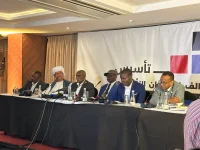Kenya faces trouble around the world because it backed Sudanese rebels that many countries say committed mass murder and forced millions from their homes. Big world powers support Sudan's official military against these rebels, called Rapid Support Forces (RSF), who seem to have President Ruto's quiet approval.
RSF leaders led by Mohamed Hamdan Gagalo, nicknamed Hemedti, visited Nairobi and announced they created their parallel government with a new constitution. This made Sudan angry at Kenya for meddling in its business. The situation grew worse as major countries like America, China, Russia, Britain, Turkey, and Guyana all publicly backed Sudan's military ruler, General Abdel Fattah al-Burhan.
The US State Department expressed deep concern about RSF signing a "transitional constitution." China told the UN Security Council that creating a parallel government might break Sudan apart. Acting US representative John Kelly warned this move hurts peace efforts and risks splitting the country permanently. Senator Jim Risch accused Kenya of helping RSF make their "genocidal rule" look legitimate.
Last year, Congress recognized RSF actions as genocide after they caused over 150,000 deaths. The Senator called Kenya's actions "unthinkable" despite Kenya being an important US ally. The United Nations Secretary-General Antonio Guterres worried the announcement would fragment Sudan further. He stressed keeping Sudan united remains essential for long-term stability throughout the region.
Middle Eastern nations sided with Sudan. Saudi Arabia rejected any "illegitimate steps" outside Sudan's official institutions. Qatar backed Sudan's unity and independence. Kuwait also expressed support. African Security Council members Algeria, Somalia, and Sierra Leone stood behind Sudan as well. Sudan thanked these countries for defending its sovereignty.
Sudan slammed Kenya's position, saying Ruto's support for the "genocidal RSF militia" isolated Kenya internationally. Professor Peter Kagwanja believes Kenya damaged its standing as a trusted regional leader. He pointed out that Sudan accused Kenya of violating its sovereignty when it allowed rebels to meet in Nairobi on February 18 to establish a parallel government.
Kenya defended hosting the rebels, claiming it fits with Kenya's peace negotiation role. Foreign Minister Musalia Mudavadi said providing "non-partisan platforms" helps conflict parties find solutions. But geopolitical analyst Nuur Sheikh noted Saudi Arabia and Qatar's position matches United Nations efforts to uphold international law, suggesting African nations should follow this approach for lasting peace.
Kenya needs to rethink its strategy quickly or risk permanent damage to its international relationships. The diplomatic fallout threatens Kenya's standing both regionally and globally. Countries across multiple continents have aligned against Kenya's position, creating unprecedented isolation that could harm Kenya's influence and economic interests for years to come.
RSF leaders led by Mohamed Hamdan Gagalo, nicknamed Hemedti, visited Nairobi and announced they created their parallel government with a new constitution. This made Sudan angry at Kenya for meddling in its business. The situation grew worse as major countries like America, China, Russia, Britain, Turkey, and Guyana all publicly backed Sudan's military ruler, General Abdel Fattah al-Burhan.
The US State Department expressed deep concern about RSF signing a "transitional constitution." China told the UN Security Council that creating a parallel government might break Sudan apart. Acting US representative John Kelly warned this move hurts peace efforts and risks splitting the country permanently. Senator Jim Risch accused Kenya of helping RSF make their "genocidal rule" look legitimate.
Last year, Congress recognized RSF actions as genocide after they caused over 150,000 deaths. The Senator called Kenya's actions "unthinkable" despite Kenya being an important US ally. The United Nations Secretary-General Antonio Guterres worried the announcement would fragment Sudan further. He stressed keeping Sudan united remains essential for long-term stability throughout the region.
Middle Eastern nations sided with Sudan. Saudi Arabia rejected any "illegitimate steps" outside Sudan's official institutions. Qatar backed Sudan's unity and independence. Kuwait also expressed support. African Security Council members Algeria, Somalia, and Sierra Leone stood behind Sudan as well. Sudan thanked these countries for defending its sovereignty.
Sudan slammed Kenya's position, saying Ruto's support for the "genocidal RSF militia" isolated Kenya internationally. Professor Peter Kagwanja believes Kenya damaged its standing as a trusted regional leader. He pointed out that Sudan accused Kenya of violating its sovereignty when it allowed rebels to meet in Nairobi on February 18 to establish a parallel government.
Kenya defended hosting the rebels, claiming it fits with Kenya's peace negotiation role. Foreign Minister Musalia Mudavadi said providing "non-partisan platforms" helps conflict parties find solutions. But geopolitical analyst Nuur Sheikh noted Saudi Arabia and Qatar's position matches United Nations efforts to uphold international law, suggesting African nations should follow this approach for lasting peace.
Kenya needs to rethink its strategy quickly or risk permanent damage to its international relationships. The diplomatic fallout threatens Kenya's standing both regionally and globally. Countries across multiple continents have aligned against Kenya's position, creating unprecedented isolation that could harm Kenya's influence and economic interests for years to come.












